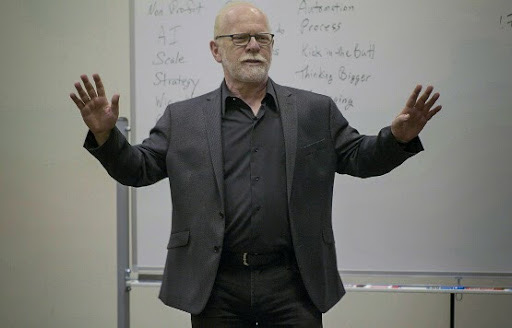The dichotomy between psychology and business is large and seemingly insurmountable from college to the real world. But these two fields are more interconnected than most expect. In fact, David Reiss, a multi-talented mastermind who has worked in hundreds of industries, claims that psychology is the key that can help businesses finally scale to success.
Reiss has always seen the world a little differently. “I see angles, approaches, vectors, and perspectives that most people don’t.” Even when a task seems impossible, he finds a way to get it done. If you were to look at Reiss’ resume, you might be overwhelmed. He has worked in roles spanning from marketing to academia to entertainment. Despite multiple transitions, Reiss notes that one thing stays consistent: he never takes no for an answer. “There’s got to be an answer. There’s always a win.”
Though Reiss’ wisdom and breadth of experience now qualify him for pretty much any job on the planet, his career transitions are always sparked by what he feels most passionate about at the time.
His intrinsic motivation and inability to slow down, whether he’s developing a marketing campaign, speaking at an international conference, or sitting at the helm of a Multinational company, have naturally catapulted him to a spectacular level of success. Even so, many of the most important tips he imparts to aspiring business owners and entrepreneurs have to do with basic psychology.
1. How You Ask a Question Determines The Outcome
Reiss’ first tip is thinking about how you ask a question. Why? There’s a direct relationship between the wording of your question and how (and sometimes whether) you’ll move forward on a project or get what you want.
One classic example Reiss likes to provide is of a priest approaching a bishop and asking a question. “If the question is ‘Your eminence, do you mind if I smoke while I pray?’ the answer is immediately ‘No, praying is a sacrament. I forbid it.’ But if the question is rephrased as ‘Your eminence, do you mind if I pray while I smoke?’ the answer is always, ‘Oh, go right ahead.’”
Using psychology to your best advantage will always propel you forward. If you can understand others’ needs and agendas to the point of making the idea seem like the other person’s, you can achieve the outcomes you want.
2. Don’t Take the Easy Route in an Interview
Interviewing is an important skill, whether you’re the interviewer or interviewee. Though most people focus more on preparing to be interviewed, Reiss encourages you to think carefully about how you interview others. Once again, the phrasing of a question is essential.
When most of us prepare for an interview, we think of certain quintessential questions. Pretty much all candidates prepare for the strengths and weaknesses question.
Usually, interviewers will directly ask: What are your weaknesses? And as Reiss explains, you’ll never get a real answer because everyone has prepared a list of weaknesses that have some type of positive spin; “I work too hard.” “I don’t know when to quit” etc., etc. If instead, you ask, “If I call your references, which of course I will, what will they say your weaknesses are?” the answer changes drastically.
Do the hard work to understand the person in front of you, and you’ll get what you want. “Grasp the person’s motivations and endgame. Get inside their head and turn things around. Never go for the easy questions,” Reiss shares.
3. Time Travel: The 3 Versions of Every Project
One of the most fascinating techniques in Reiss’ repertoire is time travel. He swears by it. According to Reiss, there are three versions of a project: the version you plan to do, the verison you actually launch, and the version you wish you had done when you look back a year later.
“As humans, we aren’t programmed to answer future tense questions. If we were, we’d all be driving Ferraris and sitting on the beach,” Reiss laughs. While he doesn’t claim to rewire the brain, he aims to move it into the future to allow people to answer past-tense questions.
To do this, Reiss takes people’s minds to around 5 years in the future. “Time is a state of mind. It doesn’t exist outside of our minds. If the mind creates time, then there’s no reason why we can’t create a different version of time,” he notes. Situated in the future, he then asks people past-tense questions about the project at hand. From start to finish, the technique takes about an hour to complete. By the end, people gain a plethora of insights about the project and exactly how to implement it.
“In any situation, hindsight is the best teacher. That shouldn’t mean that you have to wait a year for it,” Reiss says. Beyond these tips and techniques, he has hundreds of others that he has developed over the years while gleaning knowledge from each new industry. But the biggest tip of all is to never be afraid. Go forth without fear, and you can accomplish anything.
This is a Contributor Post. Opinions expressed here are opinions of the Contributor. Influencive does not endorse or review brands mentioned; does not and cannot investigate relationships with brands, products, and people mentioned and is up to the Contributor to disclose. Contributors, amongst other accounts and articles may be professional fee-based.

